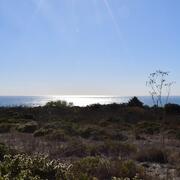...to informing restoration efforts in the Florida Everglades
...to tracking storm-related flood conditions through the South Atlantic...
...to investigating coral health in the Florida Keys & Caribbean...
...to assessing environmental contaminants on aquatic life in the Mississippi River Basin...
...USGS science spans the South Atlantic, Gulf States and Caribbean
The Southeast Region includes 13 states and two U.S. territories, Puerto Rico and the U.S. Virgin Islands
The Southeast Region includes 13 states and two U.S. territories, Puerto Rico and the U.S. Virgin Islands
Southeast Region
We conduct impartial, multi- and interdisciplinary research and monitoring to address a broad range of natural-resource issues that affect the quality of life of citizens and landscapes in the Southeastern United States and the Caribbean region.
News
AquaDePTH: Merging Aquatic Disease Surveillance Data into One Useful Tool
AquaDePTH: Merging Aquatic Disease Surveillance Data into One Useful Tool
USGS Geologic Mapping Project Supports Critical Mineral Exploration, Enhances Public Safety in the Southeast
USGS Geologic Mapping Project Supports Critical Mineral Exploration, Enhances Public Safety in the Southeast
Ecological Thresholds, Abiotic Stress, and Climate Change: A Conceptual Framework
Ecological Thresholds, Abiotic Stress, and Climate Change: A Conceptual Framework
Publications
Future aquatic invaders of the Northeast U.S.: How climate change, human vectors, and natural history could bring southern and western species north Future aquatic invaders of the Northeast U.S.: How climate change, human vectors, and natural history could bring southern and western species north
As environmental conditions change, land managers are increasingly concerned about the potential for new aquatic invasive species to move into their jurisdictions. Because managers may have limited resources, detecting invasive species early is important as prevention is more effective and less costly than ongoing mitigation of established populations. Tools built to assist early...
Assessment of antibiotic resistance genes in Caribbean corals, including those treated with amoxicillin Assessment of antibiotic resistance genes in Caribbean corals, including those treated with amoxicillin
The decimation of reefs from stony coral tissue loss disease prompted the use of a topical amoxicillin treatment to prevent coral mortality. Application of this treatment led to concerns about unintentional impacts such as potential alteration of the coral microbiome and possible spread of antibiotic resistance. We used three different methodologies—microbial RNA sequencing, 16S rRNA...
Effects of groundwater withdrawals for water bottling and municipal use, Wards Brook Valley, Maine and New Hampshire Effects of groundwater withdrawals for water bottling and municipal use, Wards Brook Valley, Maine and New Hampshire
Hydrologic models for the Wards Brook valley near Fryeburg, Maine were developed for historical (2016 – 2021) and hypothetical future conditions (2046 – 2065 and 2080 – 2099) to understand the effects of groundwater withdrawals for bottled water and municipal use on hydrologic conditions (stream base flows and groundwater levels). Analyses showed that the simulated base flows in Wards...
Science
Mobile River Basin Study
The Mobile River Basin in Alabama, Georgia, Mississippi, and Tennessee is one of the 59 study units that are part of the U.S. Geological Survey's National Water-Quality Assessment (NAWQA) Program. The long-term goals of this program are to describe the status and trends in the quality of a large, representative part of the Nation's surface- and ground-water resources, and to provide a sound...
Where Land Meets Sea: USGS Science for Resilient Coastal Habitats
USGS coastal science plays a critical role in supporting the effective, science-based management of coastal ecosystems, where the biodiversity of land and sea meet. It provides managers with the information they need to make sound decisions. Through cutting-edge research, predictive modeling, and decision-support tools, USGS empowers resource managers to make informed, science-based choices. From...
By
Ecosystems Mission Area, Land Management Research Program, California Water Science Center, Eastern Ecological Science Center, Forest and Rangeland Ecosystem Science Center, Lower Mississippi-Gulf Water Science Center, Pacific Coastal and Marine Science Center, Western Ecological Research Center (WERC), Western Fisheries Research Center, Western Geographic Science Center, Wetland and Aquatic Research Center
Groundwater Monitoring Program for the Brunswick-Glynn County Area, Georgia
In the Brunswick, Georgia area, saltwater has contaminated the Upper Floridan aquifer for nearly 50 years. Saltwater contamination has constrained further development of the Upper Floridan aquifer in the Brunswick area, which has stimulated interest in the development of alternative sources of water supply, primarily from the shallower surficial and Brunswick aquifer systems. USGS is working...




